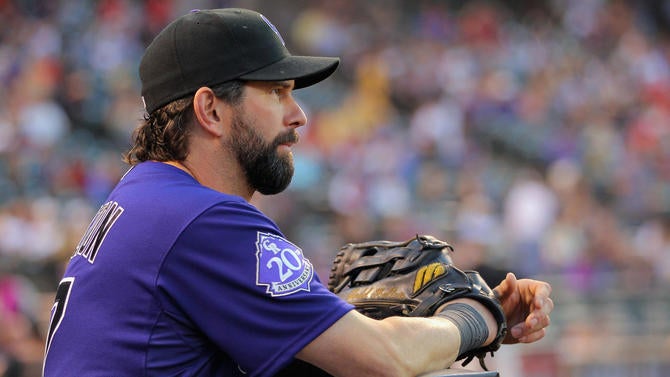With the 2019 National Baseball Hall of Fame class set to be announced next week, longtime Colorado Rockies first baseman Todd Helton finds himself already mathematically eliminated from induction. According to Ryan Thibodaux's public ballot tracker, Helton can not receive the 75 percent needed for induction this year. On the bright side, he has reached the five percent needed to remain on the ballot another year, so Helton will try again for Cooperstown in 2020.
Helton played his entire 17-season career in Colorado and is the greatest player in franchise history. He is the team's all-time leader in games (by 1,000), hits (by 1,158), home runs (by 111), total bases (1,772), times on base (by 1,868), and WAR (by 12.9). Name a stat and Helton probably holds the Rockies' record. He retired in 2013 as a career .316/.414/.539 hitter with 2,519 hits, 592 doubles, 369 home runs, 1,335 walks, 1,175 strikeouts, and 61.2 WAR. Big time production.
Of course, Helton's numbers can not be taken at face value because he played his home games in Coors Field, a hitter's paradise thanks to the thin mountain air. Colorado not only boosts home run totals, it boosts batting averages because the outfield is so large and outfielders have to play deep to protect against the extra carry. A Rockies player has won the NL batting title nine times -- nine times! -- since the franchise joined the league 25 seasons ago. Helton himself won it in 2000.
Here, for the sake of laying it out, are Helton's career home and road numbers. Like pretty much every other Rockies player, he was much more productive at Coors Field than on the road:
| PA | AVG/OBP/SLG | OPS | XBH | HR | TB | |
|---|---|---|---|---|---|---|
Home | 4,841 | .345/.441/.607 | 1.048 | 576 | 227 | 2,452 |
Road | 4,612 | .287/.386/.469 | .855 | 422 | 142 | 1,840 |
Helton didn't just play a lot of games in Coors Field. He played a lot of games in pre-humidor Coors Field, when the ball was really flying. That's how you end up hitting .372/.463/.698 with 103 extra-base hits like Helton did in 2000. His career batting average is 58 points higher at home. His career slugging percentage is 138 higher at home. His career OPS is 193 points higher at home. That is significant.
On the other hand, a career .287/.386/.469 batting line on the road is pretty darn good! Helton has a career .855 OPS on the road and there are eight first basemen currently in the Hall of Fame with a sub-.855 OPS for their career. A lot of Helton's road games were played in spacious Dodger Stadium, Petco Park, . Roughly 51 percent of his career plate appearances have come at Coors Field. More than 26 of his career road plate appearances came in those other pitcher-friendly NL West parks. It works both ways.
We have ways of adjusting a player's numbers for his ballpark and the overall league run-scoring environment, and putting them into context. Here are some of Helton's career park adjusted numbers:
- OPS+: 133
- wRC+: 132
OPS+ is the player's adjusted OPS scaled to 100. A 100 OPS+ is exactly league average. The bigger the OPS+, the better, and the smaller the OPS+, the worse. wRC+, or weighted runs created plus, is a souped-up version of OPS+. It works the same way in that 100 is league average.
According to OPS+ and wRC+, Helton was approximately 32 to 33 percent better than the league average hitter, which is outstanding. He ranks 14th all-time in both measures among first basemen with at least 7,500 plate appearances. Hall of Fame hopeful Fred McGriff has a career 134 OPS+ and 134 wRC+, for example. Hall of Famer Eddie Murray has a career 129 OPS+ and 127 wRC+. That's the sort of company Helton is keeping once you adjust his production for his home ballpark.

That said, there is also some evidence of a Coors Field hangover effect, meaning statistical park factors unfairly punish Rockies players on the road. Pitches move differently at altitude. As the ball spins, the seams of the baseball interact differently with the thin mountain air than they do with the air at sea level. That means a Rockies player could face the same pitcher at Coors Field and later at, say, Petco Park, yet his pitches will behave differently. That's tough!
Helton's home numbers are undeniably boosted by Coors Field. Chances are his road numbers -- which are very good overall -- are not as good as they could've been due to the Coors Field hangover effect. That indicates OPS+ and wRC+ are selling him short. It is overly simplistic to take Helton's career road numbers and assume that is the real him. That applies to every hitter, Coors Field or otherwise. There's so much more to it than that.
On the surface, Helton's numbers are Hall of Fame worthy, even at first base, where the bar for offensive production is quite high. He's a member of the .300/.400/.500 club with over 2,500 hits and 3,900 times on base. Only 11 players in history have done that and 10 of those 11 are in the Hall of Fame. (Manny Ramirez is the other.) The raw, unadjusted numbers are Hall of Fame worthy. Five All-Star Games and MVP votes in six different seasons. Helton was that good.
It's up to each Hall of Fame voter to decide how to handle Coors Field. Take OPS+ and wRC+ at face value and Helton is a borderline Hall of Famer. Buy into the Coors Field hangover and it maybe pushes him across the finish line. Larry Walker has Hall of Fame numbers and he didn't play in Colorado nearly as much as Helton (roughly 31 percent of his plate appearances were in Coors Field), but he hasn't come particularly close to Hall of Fame induction in his eight years on the ballot. That doesn't bode well for Helton.
My hunch is that, if McGriff has been unable to get into Cooperstown in 10 years on the ballot, Helton doesn't have much of a chance. Coors Field complicates things and, based on Walker's voting percentages, it seems many voters ding players a little too harshly for calling that ballpark home. Helton figures to remain on the ballot for several years. He strikes me as someone destined for the Hall of Very Good, and hey, there's nothing wrong with that.






















